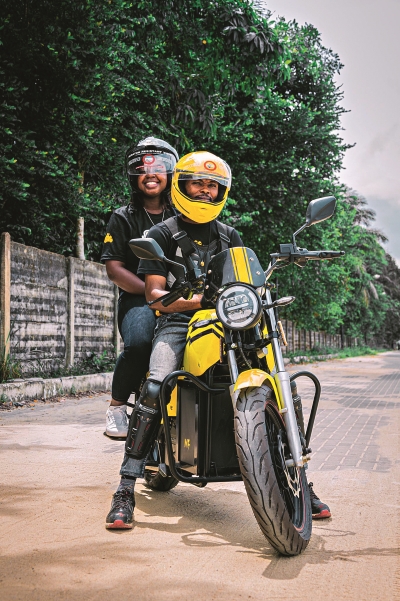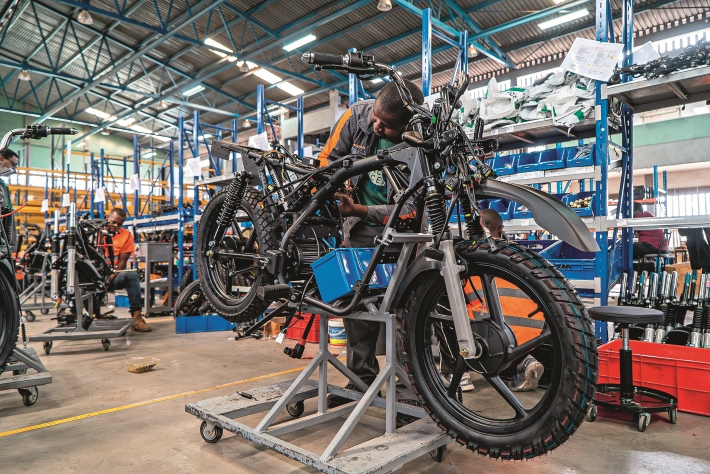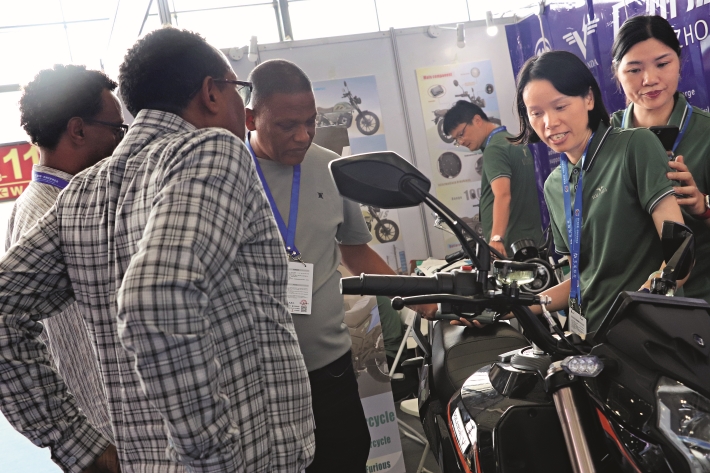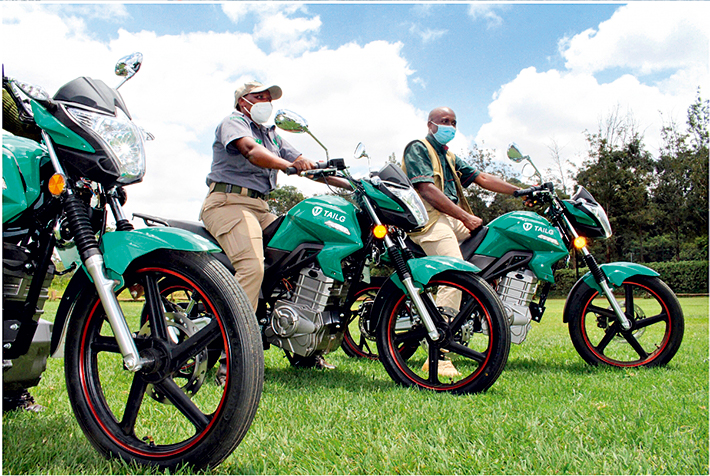|
||||||||||
| Home Nation World Business Opinion Lifestyle ChinAfrica Multimedia Columnists Documents Special Reports |
|
||||||||||
| Home Nation World Business Opinion Lifestyle ChinAfrica Multimedia Columnists Documents Special Reports |
| ChinAfrica |
| Dashing on Two Wheels |
| China-made electric motorcycles speed up transition to e-mobility in Africa |
| By Hu Fan and Torinmo Salau | VOL. 16 June 2024 ·2024-06-11 |

A MAX okada driver and his guest (MAX)
In Nigeria, commercial motorcycles, or okada, are an important means of transport for the public and provide jobs to millions of riders. As the country promotes a transition to e-mobility, more electric motorcycles are being introduced to the sector, bringing not only environmental benefits, but also economic benefits to riders.
Vincent Onyekachi in Lagos is one of these riders, who believes the electric motorcycle is much better because it helps him to save money spent on fuel and constant repair. “My former okada was always having issues and I was spending so much money to fix it, but this electric motorcycle does not create any stress. I am able to save now; before I did not have any savings,” he told ChinAfrica.
The growing need for electric motorcycles in Nigeria and other countries in Africa has provided business opportunities for Chinese motorcycle manufacturers, which are seeking growth worldwide. By means of exporting to Africa or setting up assembly plants locally, they are getting share of the growing market while contributing to local transition to e-mobility.

A sta! member assembles an electric motorbike at a Roam plant in Kenya (ROAM)
Matching needs
One of the companies leading the growth of electric mobility in Nigeria is Metro Africa Xpress Inc. (MAX). It provides online hailing services with a focus on electric okada and tricycles, or keke in local language. Established in 2015, it has provided jobs for over 40 thousand riders and achieved over 400 million trips, reducing over 300,000 tonnes of carbon dioxide emissions, according to the company.
The company is promoting e-mobility in the belief that electric vehicles (EVs) are the future of mobility in Africa. EVs have no carbon emission and are also more affordable. Compared to motorcycles powered by internal combustion engines (ICE), electrical motorcycles require about 40 percent less operational costs, as the cost of electric charging is less than refuelling, according to the company.
MAX cooperates with multiple partners to realise its e-mobility goals, among which is Kollter, a Chinese electric motorcycle manufacturer based in east China’s Jiangsu Province. Founded in 2017, the company is dedicated to the overseas markets with its medium- and high-speed motorcycles with a maximum speed over 100 km/h. As a manifestation of its technological strength, it has supplied the first high-speed electric motorcycle models for police use in the US and Spain.
Models are customised for Africa’s taxi market. More storage space is provided in the area where the oil tank is located in an ICE motorcycle. They have higher ground clearance and are equipped with better-quality tyres to cope with the rough road conditions.
So far, the company is supplying vehicles to four African countries. To reduce cost and further expand its business in the continent, the company has joined hands with African partners to set assembly facilities locally, which also helps to boost local EV manufacturing capacity.
To facilitate the frequent charging needs of these two-wheel taxis, Kollter supplies charging cabinets that can charge up to nine batteries at the same time. It has cooperated with oil company Shell to install these cabinets in gas stations. For online hailing companies like MAX, it has developed vehicle management systems and Internet-based battery renting solutions. Confident in the prospects of the African market, the company aims to become the Transsion of the electric motorcycle field in Africa.
Kollter represents an array of Chinese electric motorcycle companies seeking a presence in the African market while contributing to its e-mobility transition. Other examples include Shenzhen-based TAILG, which has joined hands with the UN Environment Programme to introduce its electric motorcycles to countries like Kenya and Rwanda. It has also teamed up with Ghana’s e-mobility company Kofa to develop model Jidi that can swap batteries at the latter’s Swap&Go charging stations. The partnership aims to deploy over half a million charging stations to support 200,000 e-bikes across the continent by 2030.
In Kenya, Chinese e-bike manufacturer Horwin has joined hands with leading local EV company Spiro to electrify transportation in Kenya and other countries. Their five-year cooperation agreement signed last year has a target of sales of 500,000 e-bikes.

African guests visit the booth of an electrical motorcycle brand at the third China-Africa Economic and Trade Expo in Changsha, Hunan Province, on 6 June 2023 (HU FAN)
Promising prospects
African countries have witnessed a rise in electric mobility in the recent years, creating a major shift towards sustainable transportation solutions across the continent. Africa is one of the fastest-growing markets for EVs, and electric motorcycles play an important role in this transition thanks to its affordability and adaptation to complicated traffic conditions, among other advantages.
The rise of oil prices has accelerated the trend. In Nigeria, for example, reports by the Nigerian Bureau of Statistics show that the average retail price of Premium Motor Spirit (Petrol) in the country was about $0.46 in January 2024, a 159.92 percent increase from January 2023.
Adedotun Eyinade, energy expert and programme director at the Nigeria Off-Grid Energy Market Acceleration Programme, notes that electric motorcycles can play a huge role in addressing the transportation challenges that have beleaguered the country. “It will no doubt have an impact on the cost of transportation. You don’t have to worry about fluctuation in the price of petrol or diesel; also the price of goods and services will become stable and this could potentially reduce inflation,” he told ChinAfrica.
Despite the progress that has already been made, e-mobility in countries like Nigeria still faces a number of challenges. These include limited infrastructure, especially in rural areas, high initial costs of EVs, and the need for supportive policies.
To address the high costs, Eyinade suggests a reduction in import duties or duty waivers for electric motors to incentivise companies that are importing or assembling vehicles locally. He also believes local manufacturing is necessary to make the vehicles affordable.
“If the vehicles are imported unassembled and then assembled locally, it would help to reduce the overall cost and more people will be able to buy them,” he said.
The good news is that companies in Africa are already making progress in building local manufacturing capability. Examples include Kenya’s leading EV maker Roam. Established in 2017, the company started by modifying ICE motorcycles into electric ones. Now it has transitioned to the design and manufacture of electric motorcycle and even bus models in line with local market needs. In 2023 alone, it produced a staggering 50,000 units of electric motorcycles.

Rangers test TAILG electric motorbikes in Nairobi, capital of Kenya, on 2 March 2021 (XINHUA)
|
||||||||||||
| About Us | Contact Us | Advertise with Us | Subscribe |
| Copyright Beijing Review All rights reserved 京ICP备08005356号-5 京公网安备110102005860号 |